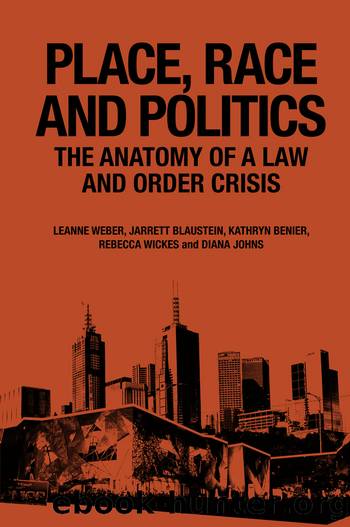Place, Race and Politics by unknow

Author:unknow
Language: eng
Format: epub
Tags: Social Science, Criminology, Race & Ethnic Relations, Political Science, General, Ethnic Studies
ISBN: 9781800430464
Google: FAZ7zgEACAAJ
Publisher: Emerald Publishing Limited
Published: 2021-11-19T04:27:01+00:00
Cleanskins and Criminals
Without knowing the specifics of the risk-based system used by police, local youth workers who supported young people who came into conflict with the law observed that police tended to place young people into rigid categories of either âcleanskinâ or âcriminalâ. These workers claimed that intensive policing of young people deemed to be âcriminalsâ (equating to the categories of YNOs or core YNOs) often undermined the genuine efforts made by these young people to change their lives. Young South Sudanese Australians in our study who disclosed that they had been in conflict with the law reported being forever judged on the basis of their past and feeling trapped in a cycle that they could not escape. These participants reported that police were constantly trying to âpin something on themâ, as they faced the prospect of being âin the system foreverâ.
One young man argued that police should instead recognise the disadvantage faced by his community to understand âwhy young people behave the way they doâ, adding that âthey don't recognise the grief in my lifeâ. Automated processes can be conceptualised as transforming individuals into âpure informationâ, divorced from the context and complexity of actual human lives (Haggerty & Ericson, 2000). In this regard, data-driven systems have the potential to amplify this pre-existing effect of distancing police intervention from its social context.
Young people who had come into conflict with the law sometimes shared their impressions of how police monitored them. One young South Sudanese Australian painted a colourful picture of how local police identified their targets each day: âStaff meeting in the morning, they're saying, âApex, Apex, Apex. Going to fuck up all the kids.â And then they think every nigga is Apex, bro. Apex doesn't even do crimeâ. These young people echoed the claims made by some youth workers that intensive policing was undermining the efforts of young people to change. One said: âWe're not crims no more, we don't want to be crims ⦠We're just trying to have funâ. However, they felt that the younger police in particular did not give them a chance: âThey treat you like an everyday criminal, you know what I mean, like an adultâ. Another said, âThey don't even know what they're arresting kids for nowadaysâ. These accounts created an impression of a conveyor belt of surveillance and arrest, such that: âThey try so hard so you can't break out of the cycle even though you tryâ.
Although Australian police often attribute negative views about police to bad experiences in countries of origin, a South Sudanese Australian mother and grassroots community worker who participated in this research saw it differently. She was critical of the police tactics of relentless surveillance of past offenders, which she said were widely experienced within her community. She noted that in Africa âpeople don't get police recordsâ. Instead, the justice system just âsolves the problemâ then âleaves people beâ; whereas in this country, she observed, âa criminal record goes on foreverâ.
At the other end of the risk spectrum,
Download
This site does not store any files on its server. We only index and link to content provided by other sites. Please contact the content providers to delete copyright contents if any and email us, we'll remove relevant links or contents immediately.
| Civil Rights | Discrimination |
| General | Human Rights |
Day by Elie Wiesel(2786)
The Age of Genius by A. C. Grayling(2592)
Gideon's Spies: The Secret History of the Mossad by Gordon Thomas(2355)
The Gulag Archipelago (Vintage Classics) by Aleksandr Solzhenitsyn(2106)
FATWA: Hunted in America by Pamela Geller(2013)
Columbine by Dave Cullen(1870)
Men Explain Things to Me by Rebecca Solnit(1729)
The Rule of Law by Bingham Tom(1701)
Anatomy of Injustice by Raymond Bonner(1671)
Examples & Explanations: Administrative Law by William F. Funk & Richard H. Seamon(1647)
Three Cups of Tea by Greg Mortenson(1620)
The Source by James A. Michener(1618)
That Every Man Be Armed by Stephen P. Halbrook(1583)
ADHD on Trial by Michael Gordon(1581)
Future Design by Unknown(1580)
Gideon's Spies by Gordon Thomas(1512)
Palestinian Walks by Raja Shehadeh(1499)
Constitutional Theory by Carl Schmitt(1458)
Nothing to Envy by Barbara Demick(1451)
